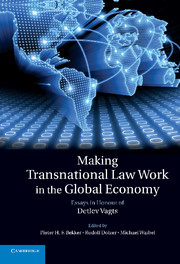Book contents
- Frontmatter
- Contents
- List of contributors
- Foreword: the transnationalism of Detlev Vagts
- List of cases cited
- List of abbreviations and acronyms
- Introduction: a Festschrift to celebrate Detlev Vagts' contributions to transnational law
- 1 Detlev Vagts and the Harvard Law School
- 2 Constructing and developing transnational law: the contribution of Detlev Vagts
- I International law in general
- II Transnational economic law
- 14 Sovereignty-plus in the era of interdependence: toward an international convention on combating human rights violations by Transnational Corporations
- 15 The noisy secrecy: Swiss banking law in international dispute
- 16 Not-for-profit organisations, conflicts of laws and the right of establishment under the EC Treaty
- 17 The meaning of ‘investment’ in the ICSID Convention
- 18 Toward a proper perspective of the private company's distinctiveness
- 19 Administrative law and international law: the encounter of an odd couple
- 20 Making transnational law work through regime-building: the case of international investment law
- 21 Creditor protection in international law
- 22 Stability, integration and political modalities: some American reflections on the European project after the financial crisis
- III Transnational lawyering and dispute resolution
- Bibliography of Detlev Vagts
- Index
19 - Administrative law and international law: the encounter of an odd couple
from II - Transnational economic law
Published online by Cambridge University Press: 17 November 2010
- Frontmatter
- Contents
- List of contributors
- Foreword: the transnationalism of Detlev Vagts
- List of cases cited
- List of abbreviations and acronyms
- Introduction: a Festschrift to celebrate Detlev Vagts' contributions to transnational law
- 1 Detlev Vagts and the Harvard Law School
- 2 Constructing and developing transnational law: the contribution of Detlev Vagts
- I International law in general
- II Transnational economic law
- 14 Sovereignty-plus in the era of interdependence: toward an international convention on combating human rights violations by Transnational Corporations
- 15 The noisy secrecy: Swiss banking law in international dispute
- 16 Not-for-profit organisations, conflicts of laws and the right of establishment under the EC Treaty
- 17 The meaning of ‘investment’ in the ICSID Convention
- 18 Toward a proper perspective of the private company's distinctiveness
- 19 Administrative law and international law: the encounter of an odd couple
- 20 Making transnational law work through regime-building: the case of international investment law
- 21 Creditor protection in international law
- 22 Stability, integration and political modalities: some American reflections on the European project after the financial crisis
- III Transnational lawyering and dispute resolution
- Bibliography of Detlev Vagts
- Index
Summary
Introduction
It is hard to find a branch of law that has not been affected by globalisation. As one might expect, the legal areas most influenced by this phenomenon have been those whose core principles and concepts involve economic relations. Important issues of commercial law, intellectual property and competition law, to mention just a few, have been largely reshaped by the forces of this economic transformation.
But there have been other fields of the law that have proven to be more resistant to the winds of globalisation. In general, they are fields of law involving political relations between the State and its nationals. One such field is administrative law. A branch of the law long regarded as the bastion of the nation-State, administrative law, is perhaps the quintessential legal field that is purely domestic in character. Its rise as an autonomous area of the law, with its distinctive principles, rules, traditions and discourse, was closely linked with the construction of the modern State. Few branches of law can claim to be more immune to affairs occurring beyond the national borders than administrative law.
Nonetheless, recent developments in international law seem to suggest that this may no longer be the case. Under the impressive network of bilateral investment treaties (BITs) and the International Convention for the Settlement of Disputes between States and Nationals of other States (ICSID), and the growing jurisprudence produced by international tribunals – a remarkable feature of today's international scene – administrative law, as developed and applied by the States that are parties to these international instruments, is becoming more and more relevant to international law.
- Type
- Chapter
- Information
- Making Transnational Law Work in the Global EconomyEssays in Honour of Detlev Vagts, pp. 380 - 405Publisher: Cambridge University PressPrint publication year: 2010



